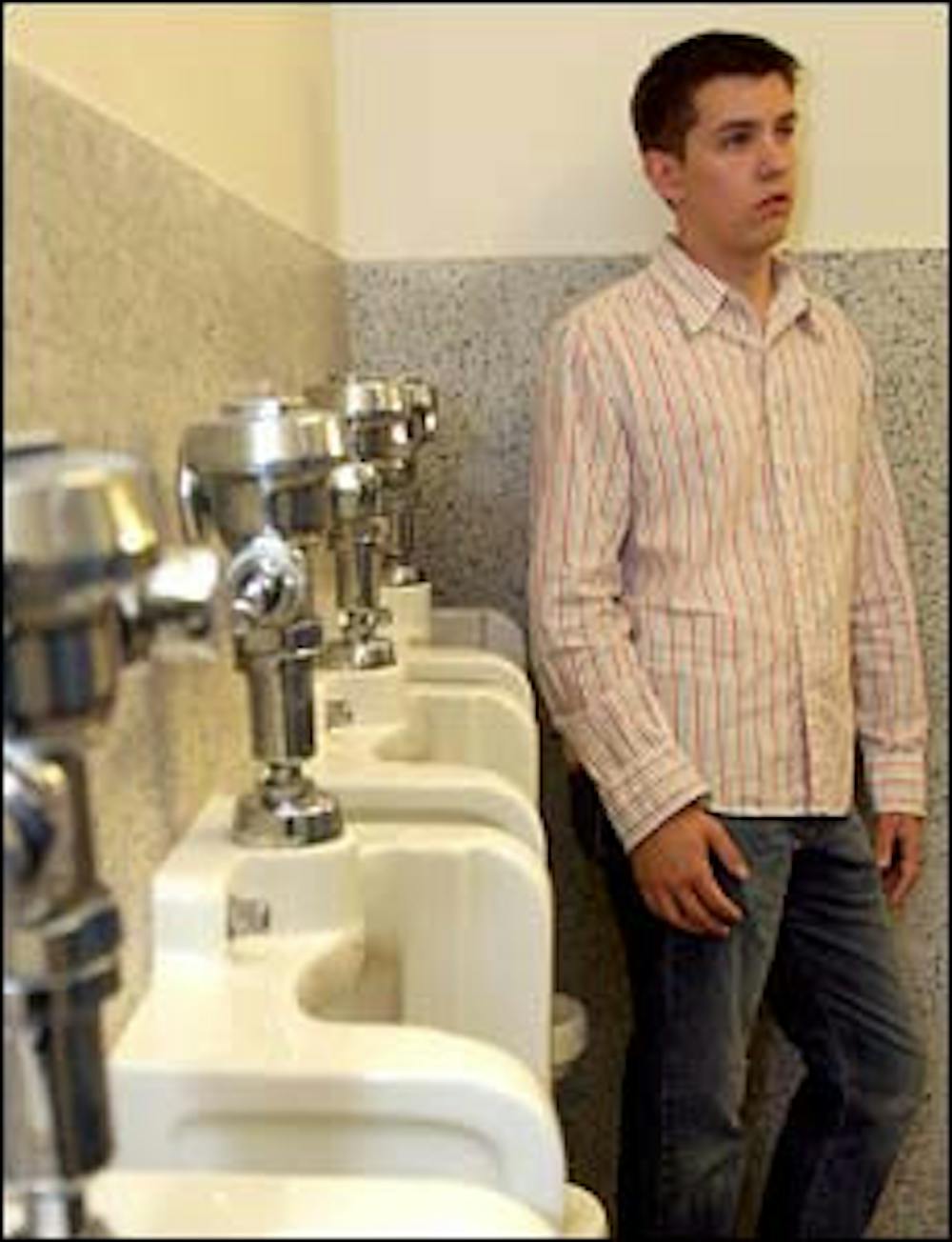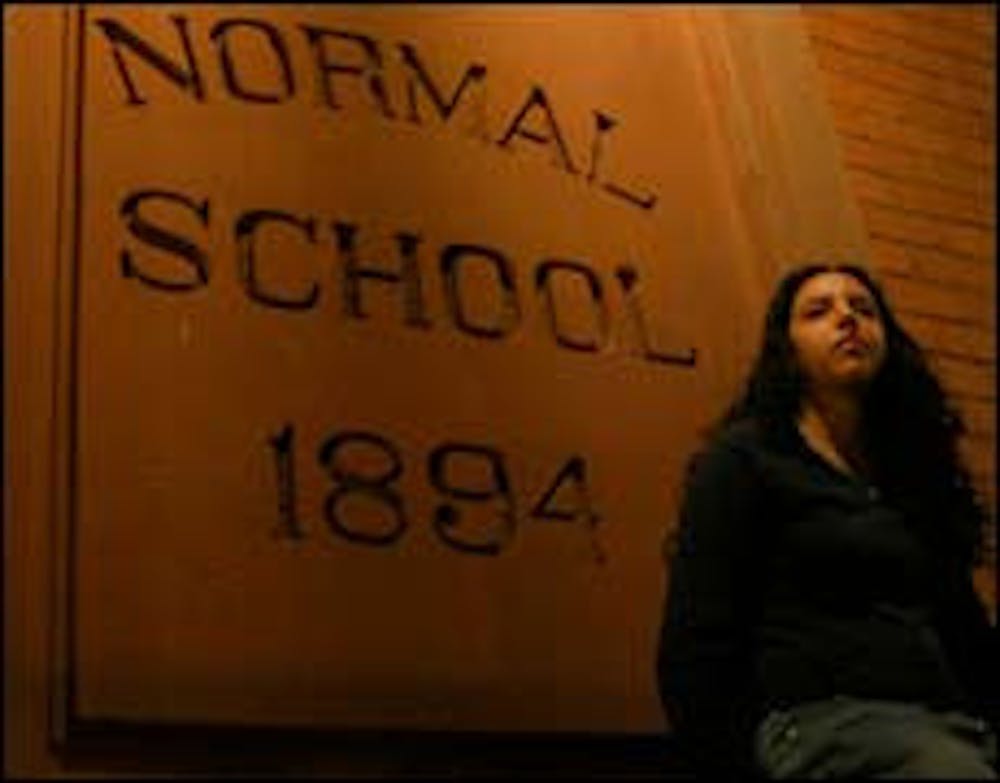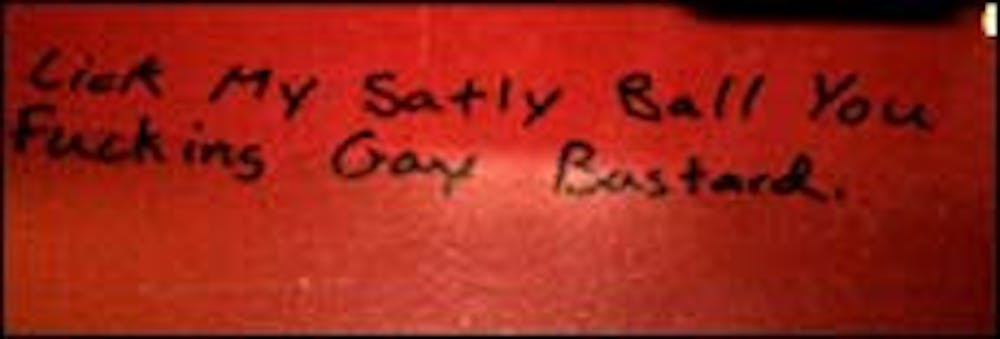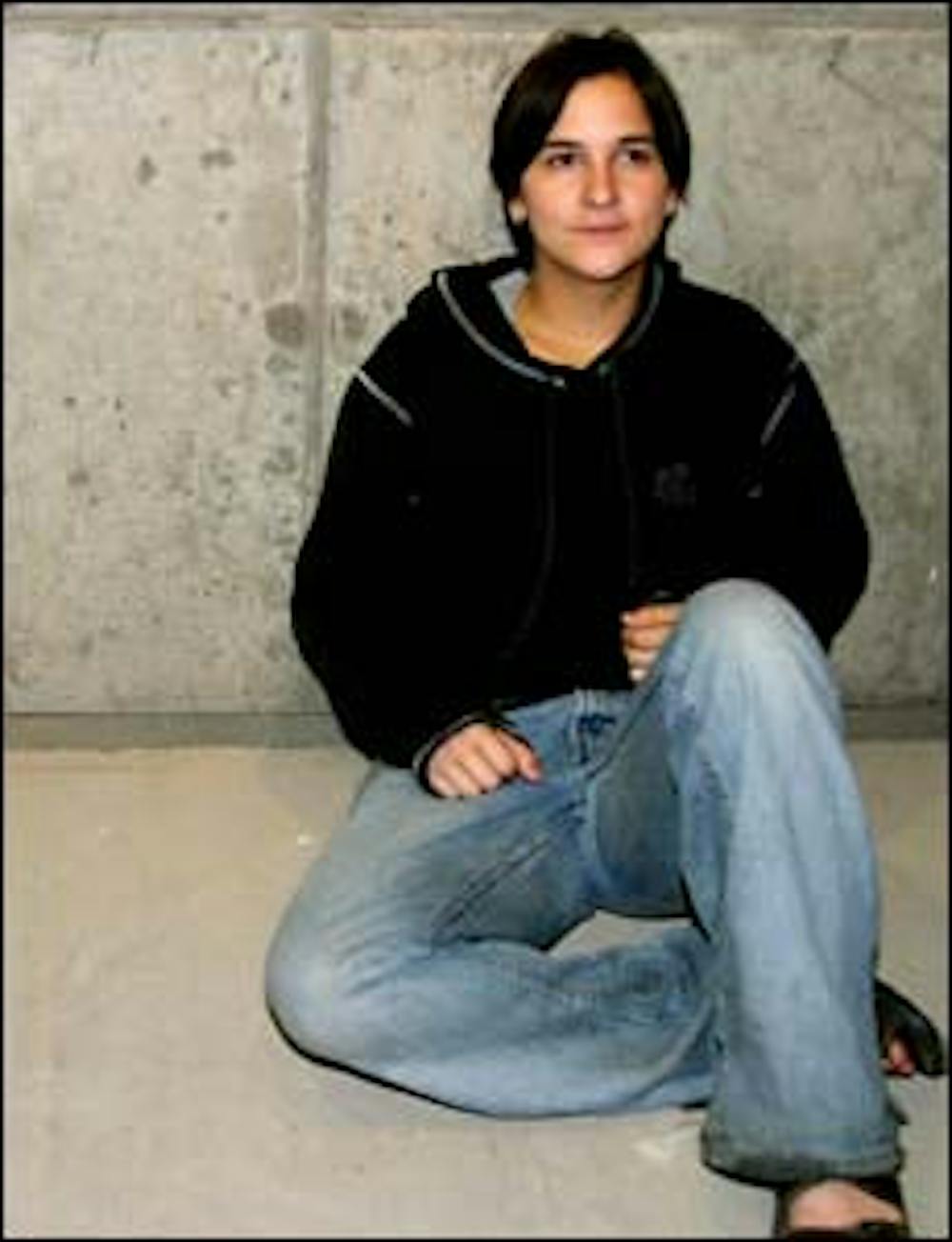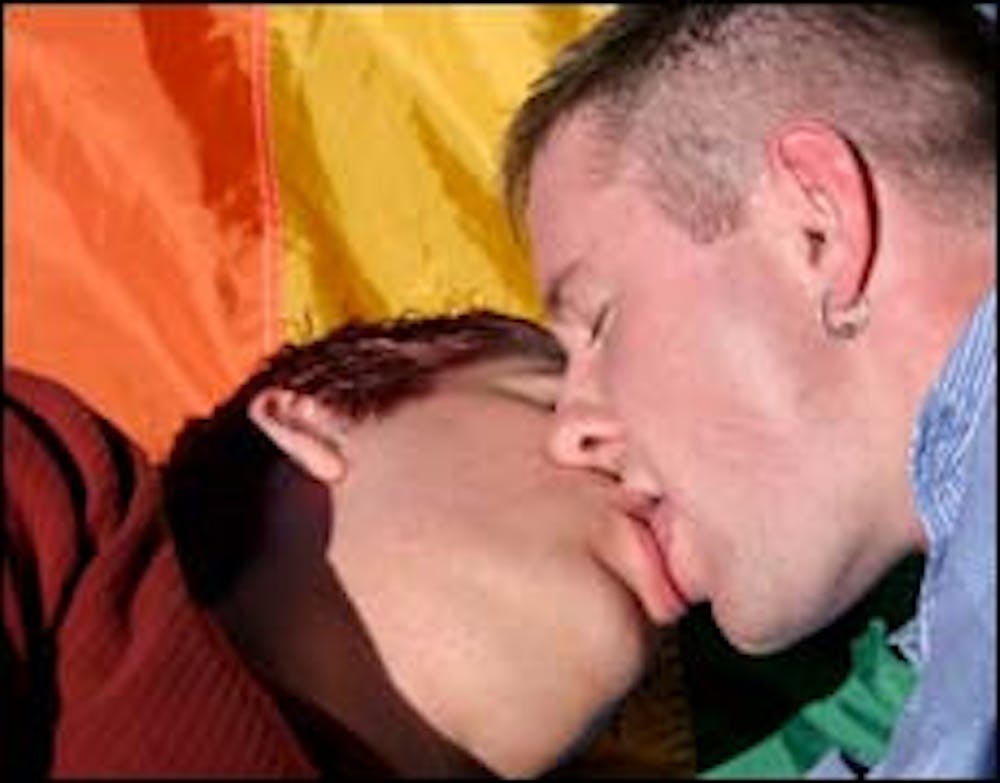There were eight bias-related incidents reported on campus in October. Each one targeted the homosexual community at ASU, a self-proclaimed liberal university that supposedly thrives on its diversity.
On Oct. 2, "Suck my cock, faggot" was written on the car of a gay male student.
On Oct. 9 - National Coming Out Day - a straight ally wearing a T-shirt supporting National Coming Out Day was called a "faggot" in class after explaining the meaning of the shirt.
The next day, a participant of National Coming Out Day found derogatory words written on the white board outside his dorm room door, and on Oct. 16, a gay male student was told, "Fuck you, faggot" while he was working as a security officer at the Towers apartments on campus.
That same day, a group of students apart of Sigma Beta Phi - a fraternity for gay/bisexual/straight and questioning men - were taunted and threatened while waiting for a seat at the IHOP restaurant on Apache Boulevard.
On Oct. 17, a gay male student was verbally attacked in a Memorial Union elevator, where two men reportedly mocked him and said, "It smells like girl in here."
Journalism freshman Andrew Moe says he got a harsh reality check that same week. After a friend came into Moe's leadership class obviously upset, Moe agreed to follow him into the bathroom of the Farmer Education building.
"I was instantly sickened by what I saw," Moe says. Statements such as "Get AIDS here," "Kill the fags" and "All cock-suckers should die" covered the walls and door.
"I hadn't faced any adversity regarding my sexuality since I got here," says Moe, who came from Wisconsin, the first state with an openly gay woman in the U.S. House of Representatives. "I always knew I wanted to go to a school with a lot of diversity ... [S]eeing that made me face the reality that I'm not in the most accepting place in the world."
After the initial shock, Moe says he and his friend decided they needed to do something about it. But when they contacted the dean, they found that complaints already had been made about the graffiti and it was "being investigated." Nothing had been done, and Moe says he didn't expect any action. So he e-mailed Tempe Mayor Neil Giuliano, and within a week the graffiti was painted over - four times.
This week ASU President Michael Crow sent an e-mail to ASU faculty and staff in response to the recent incidents, and said he is very disturbed by them, as ASU takes "great pride in its diverse student, staff and faculty population." When acts of harassment occur based on a person's individual characteristics such as sexual orientation, Crow says they should be reported immediately to the appropriate offices on campus, and "perpetrators, when caught, will be subject to the full extent of our disciplinary actions."
Fourth-year psychology major Lea Mollon, president of ASU's lesbian and bisexual social group Sappho says, "The recent events that have happened scared me a bit. It's not happening to me but to some of my very close friends. I resent those incidents. I wish there was something I could do."
Barbara Mawhiney, director of Equal Opportunity/Affirmative Action on campus, says the university was as responsive as it could be in regards to the recent acts of discrimination. Part of the issue, she says, "is will people come forward and alert university offices so they can get help?"
Mollon says that smaller acts of discrimination happen every day on campus, and after awhile it's not even worth the effort it takes to report them.
Mawhiney says the university "doesn't want any individuals harassing another individual," regardless of sexuality, race, religion or any diversity issues. It wants to help people learn that "you don't have to share the same views, but you can still treat each other with respect."
Sam Holdren, facilitator of ASU's Lesbian Gay Bisexual Transgender Queer Coalition, says the incidences have united the LGBTQ community and given them a stronger voice to speak out on campus.
"It is not acceptable for this type of behavior to continue on a campus where students are supposed to feel safe and secure in their living, classroom and workplace environments," Holdren says. "Our community will not be silenced by the perpetrators of the abhorrent acts."
Two steps forward
This year has been a year of success stories for the gay community at ASU and across the nation.
In 2002, ASU's LGBTQ Coalition was re-formed, thanks to Holdren. The coalition is now comprised of nine clubs, four of which are new to ASU this semester. There are now more than 150 active members in the coalition and 350 people on the listserv.
In spring 2003, Sigma Phi Beta broke away from its national affiliate, Alpha Lambda Tao, to form ASU's first gay-straight fraternity.
This semester will see the coming out of the nation's first lesbian sorority, Gamma Rho Lambda, which is being started at ASU.
Dozens of people participated in last month's National Coming Out Day at ASU, both homosexuals and gay alliances. With the support of the coalition, many students were given the power to express their sexuality in ways they couldn't before.
Nationally, archaic anti-sodomy laws were discarded, and homosexual Americans can now cross the Canadian border to get legally married. The Permanent Partner Immigration Act, which deals with homosexual marriage status in regards to immigration issues, also was passed recently.
"In the past 30 years, we've come so far," Moe says. "Thirty years ago, being gay was on the list of mental diseases. Since then there have been so many accomplishments. People are starting to realize gays and lesbians are getting the shaft when it comes to benefits."
So why the hate?
The coalition officially has called on the ASU administration to address the needs of the LGBTQ community. In a time when hate seems to be running rampant across campus, and the gay community is discouraged and even fearful, Janette Elias, president of the Gay Straight Whatever Alliance, says the coalition feels this is a vital time for the University to act.
"[The incidents] are a realization that the campus environment isn't as liberal as we like to pretend," the political science junior says. "When you have eight hate incidences in a row, it's a slap in the face. If the administration doesn't act, it will be a large step backwards. But if the University does act and listen to the needs of the community, it could be a huge step forward."
On Oct. 20, the coalition officially called on the University to address the needs of LGBTQ students. The coalition has laid four specific issues on the table and is awaiting a meeting with ASU's Equal Opportunity/Affirmative Action office. The coalition expects the University to add gender identity and expression to its nondiscrimination policy, approve a gay and lesbian studies program, increase funding for diversity and awareness programming on campus, and provide a larger space for a resource center for LGBTQ students.
"I want the University to know that we expect these things to happen," Holdren says. "But I trust that they will listen to us and help us address our needs. They have never given me a reason not [to]."
One major advance that is in the works is that the University is considering adding gender identity and expression to its nondiscrimination clause. The clause currently includes sexual orientation but does not address gender issues. Gender issues refer to "someone who identifies other than what their anatomy tells them," says Thomas Walker, a coalition adviser. Adding on to the nondiscrimination clause could help students when being assigned to residence halls and raise the importance of unisex bathrooms. But it's hard to say how long it will be before students see any changes.
"It could take months - years - to adjust procedure to fit with policy," says Walker who was a member of Lambda League, the previous name for LGBTQ, when he was a student at ASU.
The coalition also is working with student health and the ASU police on education issues, Walker says. He says if the police and health center staff are more educated, they can serve the LGBTQ community better and educate the community on what discriminatory incidents should be reported to the police.
It has taken a number of reported hate incidences for the University to act at all, Elias says, which is ironic because "ASU has always been a very liberal campus."
But Mawhiney adds that many times the University doesn't have proper notice of such actions on campus. "It's one thing if [the victim] tells The State Press," she says. "But if they don't tell the any of the offices on campus, they're not going to get help."
Two steps back
"A lot of [the incidents are] a backlash toward progression," Elias, 20, says. "The same thing happened with the Civil Rights Movement and women's rights. People don't know how to react ... but it's also inspiring. It makes us feel like we need to be here."
Though the coalition has presented the University with a list of issues it feels need to be addressed, the only one actually being acted upon is adding gender identity and expression to the nondiscrimination clause.
"In general, overall, the University does a lot, but it's the little things," Walker says.
The little things include issues such as adding gay and lesbian studies programs to ASU's curriculum. Walker says that though most of ASU's peer universities have such programs, ASU has tabled the issue indefinitely. The coalition presented the issue to the University a year ago. Since then there has been no progress, and ASU does not have any gay or lesbian studies programs.
"When the University doesn't face our issues, they make it seem like it's OK," Elias says. "Meanwhile, every other minority on campus has programs."
But the University says it has no intention of favoring one group over another, and that the policies in place are there to implement equality on campus. "When you already have a policy that says you can't discriminate, that's pretty accepting, but you can't control individuals," Mawhiney says. "The message that the University sends is that everybody is equal, and we want everybody to be treated equally."
Greg Schrader, senior psychologist at ASU's Counseling & Consultation Services, says that when he came to ASU 10 years ago he was shocked at how behind the times ASU was in terms of LGBTQ rights. Though he's seen a couple of small changes over the years, he says he's still waiting for the University to come up to speed with the rest of the country. Schrader says he's seen willingness from the University to sit and talk about the issues, but he hasn't seen any willingness to act.
"It would be nice if the administration would take a stronger position of leadership on the issues," says Schrader who facilitates weekly coming-out discussion groups on campus. "Domestic partner benefits are something we've been working on since I've been here, and there's been very little progress. I know people who haven't taken jobs at ASU because of that."
Schrader adds that if he would have been in a relationship at the time of his job offer from ASU, he wouldn't have taken it.
"If we're trying to be a new University like Dr. Crow says, we need to be leading the country in terms of the benefits we have to offer," Schrader says.
In his e-mail, Crow reminded faculty and staff that "the University has numerous avenues available for education and discourse about our differences. Programs such as the Intergroup Relations Center and the Campus Environment Team offer opportunities for differences to be explored and individuals to learn the benefits of sharing an educational environment rich in diversity."
Walker says he feels the University needs to be more aware of discriminatory things that are happening on campus, such as rumors that the ROTC discriminates against gays and lesbians, and discrimination issues regarding blood donations on campus. When a male student goes to donate blood on campus, one of the first questions he is asked is if he ever has had sex with another man since 1973. If the students give any other answer besides "absolutely not," they are rejected, Walker says.
Sue Thew, public information officer for United Blood Services of Arizona, says the service has no choice but to have a strict screening procedure. UBS forms its screening process around a list of "high-risk behavior for contracting HIV" administered by the Food and Drug Administration, and is not zoning in on any specific group, but specific behaviors.
"Being gay in itself does not prevent a person from giving blood," Thew says. "It's simply the behavior as outlined by the FDA."
Holdren says the process is blatantly discriminating and "perpetuates the stereotype that AIDS is a gay disease. It's not. HIV and AIDS is on the rise for all communities, not just ours. Everybody is at risk."
Schrader's list of issues concerns some of the same things, most of which he says the University is oblivious to - such as "having ASU vendors and business partners held to the same discrimination standards" as the rest of the University and "having more visible support for [LGBTQ] students."
Schrader, Walker and students within the coalition say they feel the University may not be entirely at fault when it comes to the issues. Because ASU is a publicly funded university, the state legislature has a certain amount of say when it comes to general university opinion on issues such as discrimination against gays and lesbians.
"Arizona is just very conservative," Mollon says.
Walker agrees, saying: "In some ways the University's hands are tied. At the moment, the University has done everything they can [on some issues]...just by letting the coalition operate publicly."
Schrader agrees this could definitely be a reason the University is hesitant to act on the issues, but after seeing other universities overcome similar legislatures, he questions the reason's legitimacy. He says he thinks the University could be "more creative in terms of dealing with these issues."
It could be worse
"Everyone can always find something else the University could do for them, but overall they do a really good job," Walker says.
Though ASU may be slow to act on LGBTQ issues, members of the coalition are making sure their voices are heard.
The coalition currently is involved in several projects to raise awareness on campus about LGBTQ issues. The Speaker's Bureau, a new addition to the coalition, attends different classes on campus to talk about being LGBTQ. Mollon says the level of ignorance she has seen from students when it comes to being gay or lesbian shocks her. In one class she spoke to, the first question a woman asked her was, "How do lesbians have sex?"
"People really don't know anything about homosexuality," she says. "It's OK, but it's not."
Like Moe says, "People are not born to hate; they are taught to hate." He says he doesn't expect things to change overnight but has a positive outlook for the future.
For now, each coalition member is working in his or her own way to make ASU a more accepting campus, and the first step is education. "It takes time and money," Holdren says. "I think this campus is open-minded enough that we will move forward in a direction that's more inclusive." Shrader says that although there is a lot of acceptance on campus, there's still a lot of homophobia and discrimination. The LGBTQ community isn't asking for special rights - simply equal rights. Without the University's support, however, it has a long road ahead of them.
"I want people to just think of me as Andrew," Moe says. "Being gay is just one of a number of aspects of me. I'm a normal person just like everyone else. It should be a nonissue in the fact that people shouldn't care. I'm not going to say it's hard being gay. I love being gay. I think it has made me a stronger person."
Reach the reporter at jaime.schneider@asu.edu.
